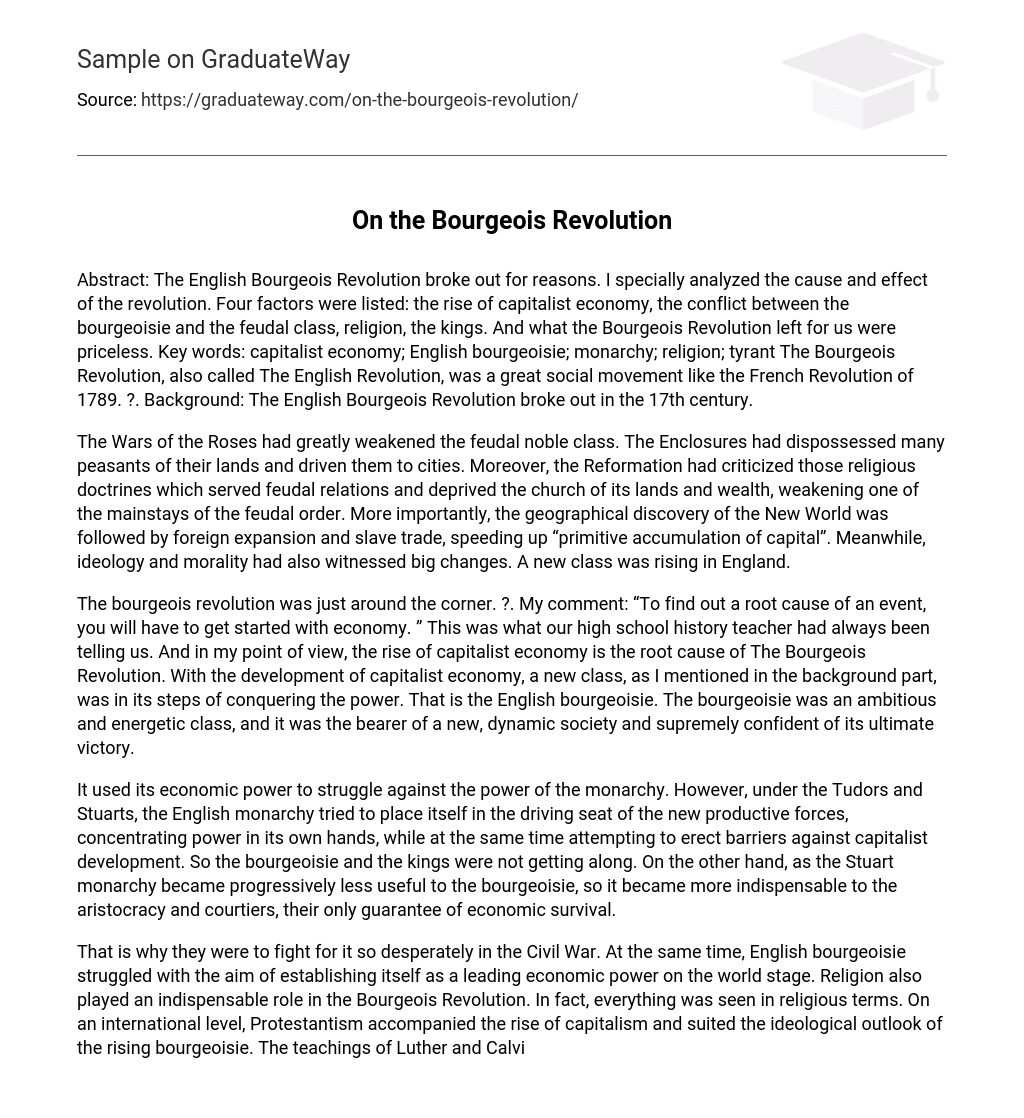Abstract: The English Bourgeois Revolution broke out for reasons. I specially analyzed the cause and effect of the revolution. Four factors were listed: the rise of capitalist economy, the conflict between the bourgeoisie and the feudal class, religion, the kings. And what the Bourgeois Revolution left for us were priceless. Key words: capitalist economy; English bourgeoisie; monarchy; religion; tyrant The Bourgeois Revolution, also called The English Revolution, was a great social movement like the French Revolution of 1789. ?. Background: The English Bourgeois Revolution broke out in the 17th century.
The Wars of the Roses had greatly weakened the feudal noble class. The Enclosures had dispossessed many peasants of their lands and driven them to cities. Moreover, the Reformation had criticized those religious doctrines which served feudal relations and deprived the church of its lands and wealth, weakening one of the mainstays of the feudal order. More importantly, the geographical discovery of the New World was followed by foreign expansion and slave trade, speeding up “primitive accumulation of capital”. Meanwhile, ideology and morality had also witnessed big changes. A new class was rising in England.
The bourgeois revolution was just around the corner. ?. My comment: “To find out a root cause of an event, you will have to get started with economy. ” This was what our high school history teacher had always been telling us. And in my point of view, the rise of capitalist economy is the root cause of The Bourgeois Revolution. With the development of capitalist economy, a new class, as I mentioned in the background part, was in its steps of conquering the power. That is the English bourgeoisie. The bourgeoisie was an ambitious and energetic class, and it was the bearer of a new, dynamic society and supremely confident of its ultimate victory.
It used its economic power to struggle against the power of the monarchy. However, under the Tudors and Stuarts, the English monarchy tried to place itself in the driving seat of the new productive forces, concentrating power in its own hands, while at the same time attempting to erect barriers against capitalist development. So the bourgeoisie and the kings were not getting along. On the other hand, as the Stuart monarchy became progressively less useful to the bourgeoisie, so it became more indispensable to the aristocracy and courtiers, their only guarantee of economic survival.
That is why they were to fight for it so desperately in the Civil War. At the same time, English bourgeoisie struggled with the aim of establishing itself as a leading economic power on the world stage. Religion also played an indispensable role in the Bourgeois Revolution. In fact, everything was seen in religious terms. On an international level, Protestantism accompanied the rise of capitalism and suited the ideological outlook of the rising bourgeoisie. The teachings of Luther and Calvin broke down the old ideology.
Its stress on individual conscience, individual success, thrift, hard work, contributed to the development of a capitalist outlook. The Reformation in England had far reaching consequences, especially the spread of Protestantism, but with the sale of Church lands and monasteries, it also created a vested interest in the new religion. In short, religion played an important part for the contending classes. In addition, some nationalist conflicts were an integral part of The Bourgeois Revolution: the threat of an alliance between the monarchy and the forces of Catholic, and fear of foreign intervention by its French and Spanish rivals.
Last but not least, the kings’ being deposed or even beheaded was my favourite part of the whole Bourgeois Revolution. The kings were deserved to be treated like this, for they didn’t treat the Parliament and the people very well. For instance, James I ridiculously believed that the king’s will was the only law; Charles I ruled for eleven years without summoning Parliament. He even persecuted the Puritans. And he asked people for “loans” and those who refused were put into prison. Finally, the absolutist rule of the Stuarts aroused the resistance of the people and the bourgeoisie.
In the end, Oliver Cromwell signed the death warrant of Charles I. Nevertheless, Cromwell, as the Lord Protector, didn’t make a good “king” to the people. As William Erbery, in Tyranipocrit Discovered said, “The new tyrants which have driven out the old are in all things so bad or worse than the old tyrants were, only they have, or pretend to have, a better faith and a new form of tyranny. ” Although the Revolution produced a military dictator in the form of Cromwell and ultimately led to the restoration of the Stuart monarchy, it did create the foundation for a new kind of monarchy which was quite different from the “absolute” monarchies. . Conclusion The English Bourgeois Revolution completed the transition from the absolute monarchy to constitutional monarchy. It was an epoch-making event in the history of the world. It concluded the medieval period—the period of feudalism, and marked the beginning of the modern period—the period of capitalism. It paved the way for the rapid growth of capitalism in England. It also created a body of ideas which were to be very influential in the development of Anglo-American political and constitutional thought in the 18th century.





